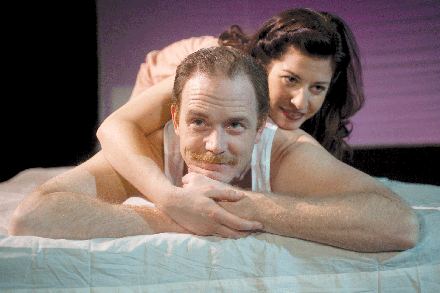Two local plays — Jack and Rochelle and A Report on the Banality of Love — offer divergent views on relationships during a cataclysmic time in Europe
By DORIS RUBENSTEIN
A Report on the Banality of Love, the current production at the Minnesota Jewish Theatre Company, is a play not for the faint of intellect, nor for the faint of tushy. The hour-and-three-quarters-long play is performed without an intermission, which is necessary so that the audience does not lose its concentration on this highly demanding script.
The play tells the story, over time, of two of the 20th century’s most admired philosophers — the Jewish Hannah Arendt (Carolyn Jenson) and the German Martin Heidegger (Dan Hopman). It is a story of courage and cowardice, of intellectual and physical passion, of truth and deception. In other words, don’t expect a chorus line or a shoot-out at the OK Corral, unless you can make the leap from bullets to words as weapons of personal destruction.
Reviewed: Jack and Rochelle and A Report on the Banality of Love
A superficial synopsis of the play boils down to professor meets student; professor seduces willing student; professor and student refuse to break it off over the course of 25 years. Across their numerous encounters, we learn the how and what of their romantic and intellectual relationship.
 Dan Hopman stars as Martin Heidegger and Carolyn Jenson stars as Hannah Arendt in the Minnesota Jewish Theatre Company production of A Report on the Banality of Love, which runs through March 28. (Photo: Sarah Whiting)
Dan Hopman stars as Martin Heidegger and Carolyn Jenson stars as Hannah Arendt in the Minnesota Jewish Theatre Company production of A Report on the Banality of Love, which runs through March 28. (Photo: Sarah Whiting)
The playwright, Mario Diament, is liberal here in his references to persons, works and events philosophical, artistic, historical, psychological, and in his use of rhetoric. Don’t feel bad if you don’t catch all the names dropped; only college professors like Diament and his protagonists are going to have the Ph.D.s needed to recognize them all.
Diament and director Anne Byrd make clever use of a video of four “academics” (Sean Byrd, Anna Olson, Kurt Schweickhardt and MJTC’s own Artistic Director Barbara Brooks) who appear at the opening of each scene to conduct a rarified analysis of the Arendt-Heidegger relationship, and the pros and cons of one of the play’s — and history’s — questions: Was Heidegger a Nazi or not?
In exploring Arendt’s and Heidegger’s minds as they probe why they love each other and how they love each other in Nazi Germany, the audience is exposed to some of the loveliest language I’ve heard in the theater that is not written by Shakespeare. Since I am not familiar with the writings of either of these philosophers, I will credit Diament with this achievement.
A Report on the Banality of Love shares one thing with the story of every doomed pair of lovers. The audience surely asks how Arendt can continue to love Heidegger despite his many character flaws. Her fatal flaw is that her love for him prevents her from judging him.
***
Arendt and Heidegger’s physical and intellectual passion in the midst of the Nazi horror contrasts sharply with the purity and innocence of the romance between the protagonists of Theatre Or’s production of Jack and Rochelle, directed by Todd Bruse, which is currently running at the Sabes JCC.
Buffy Sedlachek’s play, based on the memoir Jack and Rochelle: A Holocaust Story of Love and Resistance (Graywolf Press), by Larry Sutin, tells a story of two young people, too young to have developed the world-view philosophy of Hannah Arendt but wise enough to know that they must fight the Nazi evil with all their physical strength.
The memories of the adult Jack Sutin (Matt Greseth) and Rochelle Schleiff Sutin (Tina Sigel) fully inhabit Erica Zaffarano’s stark stage setting of black and gray, strewn with dead trees and the detritus of war, and populated with reanimated memories of their murdered families, their friends and comrades in arms, and the Nazis who are more nightmare than memory.
The Sutins are part narrator and part Greek chorus throughout the play. They show tremendous empathy for their former, wartime, selves (Jeffrey Shockley and Roneet Aliza Rahamim), with adult Rochelle occasionally breaking the barrier of time to share in the emotion of her young counterpart. The ensemble is a highly youthful crew, with some members drawn from local youth theater troupes.
Jack and Rochelle’s story takes them from their conventional, comfortable urban middle-class lives in Poland with loving parents and dance parties down the vortex of loss and fear before they climb the ladder of defiance and triumph as partisan fighters. This is a lot to pack into a 90-minute play, both artistically and emotionally. But the story and the actors achieve this goal: at the end of the performance, the people in our audience remained still and in their seats, waiting for more, wanting to connect with the actors and their characters.
As in many Holocaust plays, we meet righteous Christians and evil Nazis. With an ensemble playing many roles, I felt that the device of having the Nazis wear masks was particularly effective: it served to dehumanize the actors and heightened the awful effect of their evil words and deeds.
Words were a not insignificant problem in the play — not the scripted words, but their technical delivery. The Sabes theater is plagued with bad acoustics and insufficient amplification. When all the characters are speaking with accents, the shortcomings of the theater are magnified and too much dialog is lost to an audience anxious to catch every word. Is there a donor in the house to remedy this situation?
While Twin Cities residents can only know Hannah Arendt through her writings or a play, we are fortunate still to have Jack and Rochelle among us, resident in St. Louis Park. If you can’t have a cup of coffee with them to hear their story firsthand, the next best thing is coming to the Sabes JCC to learn and be inspired by them.
***
A Report on the Banality of Love is performed 8 p.m. Saturdays, and 2 and 7 p.m. Sundays, through March 28 at Hillcrest Center, 1978 Ford Pkwy., St. Paul. MJTC’s Doorways program will take place at 4 p.m. on every Sunday during the run of the play.
For tickets, call 651-647-4315 or e-mail: info@mnjewishtheatre.org. For information, visit: www.mnjewishtheatre.org.
Theatre Or’s production of Jack and Rochelle runs through March 28, with evening and matinee shows, at the Sabes JCC, 4330 S. Cedar Lake Rd., St. Louis Park. For details and tickets, go to: theatreormpls.org or call 952-381-3499.









 Dan Hopman stars as Martin Heidegger and Carolyn Jenson stars as Hannah Arendt in the Minnesota Jewish Theatre Company production of A Report on the Banality of Love, which runs through March 28. (Photo: Sarah Whiting)
Dan Hopman stars as Martin Heidegger and Carolyn Jenson stars as Hannah Arendt in the Minnesota Jewish Theatre Company production of A Report on the Banality of Love, which runs through March 28. (Photo: Sarah Whiting)









Comments 0